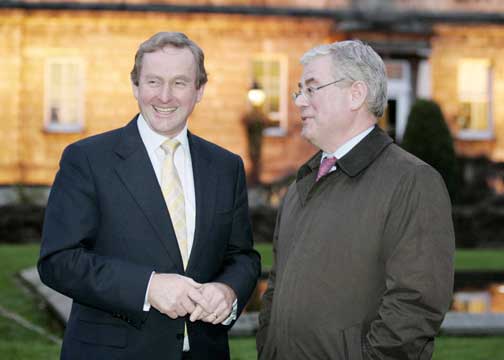


SERVICES
Tuesday October 19, 2010
Consensus Unlikely As Leaders Agree To Talks
Fine Gael leader Enda Kenny and Labour Party leader Eamon Gilmore say that they will attend the talks but expect little to be resolved (Photocall) The leaders of Ireland's main political parties will hold talks on Ireland's economic crisis, but a consensus on a four year budget plan is highly unlikely. Taoiseach Brian Cowen wrote to Enda Kenny (Fine Gael) and Eamon Gilmore (Labour) to invite them to talks saying that while the government had a duty to propose fiscal strategy, it "does not have a monopoly on wisdom". "Notwithstanding the major political differences between us," he said, "I believe that the pursuit of the national interest and the common good must have priority at this time." Mr Cowen's invitation came just days after he appeared to pour cold water on proposals from his junior coalition partner for high level all-party talks. Green Party leader John Gormley was accused of "flying a kite" with his call after Mr Cowen initially said he didn't believe such talks would achieve much. But in a U-turn, Mr Cowen later issued the invitation. Both Enda Kenny and Eamon Gilmore have accepted the invite, but have cautioned against expectations that a consensus would be found. The European Commission has demanded that the Irish government present a four-year plan to it in November, and has set a target of reducing the budget deficit to 3% of GDP by 2014. All the main parties have accepted this budgetary target - but there are significant differences over what cuts are necessary to achieve it. A political consensus would significantly improve the confidence of international investors, who recognise that there is little or no chance that the current government will be around to implement whatever four year plan it presents. Accepting the invitation to talks, Labour leader Eamon Gilmore said he was not convinced that the exercise was intended to do anything but prolong the life of the government. He said the current government does not have a mandate to govern for the next four years, and therefore there should be an immediate election. "I don't see any point in having some kind of phoney consensus," he said. Meanwhile, Fine Gael is reported to be more likely to sign up to the broad outline of the government's fiscal strategy. The party is putting the finishing touches on a major new policy document, which will aim to reform the public service. However, it will not agree with government plans to raise taxes. Leader Enda Kenny said he was glad that Mr Cowen had changed his attitude and tone in relation to all-party talks. He said the broad targets outlined had been accepted by Fine Gael for some time, but he was interested to hear what the Taoiseach has in mind beyond that. Mr Kenny said he favoured front-loading the austerity measures - by administering the tough medicine now, so that interest rates on debt would fall and the economy could begin to grow sooner. Observers say neither Mr Kenny nor Mr Gilmore have much to gain from the consensus talks - but neither will want to be seen to be putting their party political interests before the country. Meanwhile, Sinn Fein has reacted angrily to its exclusion from the talks. The Taoiseach did not extend the invitation to the party because it has made it clear it does not subscribe to the target of reducing the deficit to 3% by 2014. Talks are likely to take place within the next fortnight. Department of Finance officials are this week briefing the opposition parties on the fine detail of the economic figures. The Irish public is bracing itself for a budget, even tougher than last year's, with cuts of up to €4.3bn and possible tax increases. |
CURRENT ISSUE

RECENT ISSUES


SYNDICATE
[What is this?]
POWERED BY

HOSTED BY

Terms of Service | Privacy Policy
Website Design By C3I






